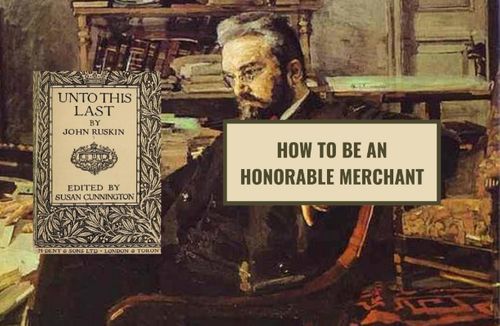A Merchant In Search Of Honor
Oct 10, 2022 · 2 mins read
0
Share

Introduction. John Ruskin was a Victorian polymath - he studied and wrote about birds, plants, human history, architecture, and politics. In his essay Unto The Last, he discusses why the merchant class isn't respected as much as soldiers - and how they can gain honor 👇
Save
Share
Merchant v/s Soldier. It may be confusing "at first sight" to note that a "peaceable and rational" merchant who trades for a living is held in "less honor" than an "unpeaceable and often irrational" soldier whose work is "slaying." But Ruskin says - this is how it must be.
Save
Share
Ruskin: “The soldier's trade essentially is not slaying but being slain. Reckless he may be, fond of pleasure or of adventure…But put him in a fortress breach, with all the pleasures of the world behind him, and only death & his duty in front, he will keep his face to the front."
Save
Share
But the merchant can still acquire honor. Ruskin shows how the market can have "its martyrdoms" and "its heroisms" just like war. He writes: "In true commerce, as in true preaching, or true fighting, it is necessary to admit the idea of occasional voluntary loss."
Save
Share
Ruskin's "5 great professions" that exist in all societies: "The Soldier's profession is to defend it. The Pastor's to teach it. The Physician's to keep it in health. The Lawyer's to enforce justice in it. The Merchant's to provide for it." And on "due occasion," to "die for it."
Save
Share
The soldier must choose death instead of leaving "his post in battle," the physician can't "leave his post in plague" no matter what, the pastor should refuse to speak "Falsehoods" come what may. The lawyer must risk his death instead of defending "injustice." And the merchant?
Save
Share
What is a Merchant's "due occasion" for death? Ruskin: "For, truly, the man who does not know when to die, does not know how to live." Ruskin states a merchant's first duty: Use his "sagacity and energy" to make quality goods and make them available at a cheap price to everyone.
Save
Share
Since manufacturing involves the "agency of many lives and hands," a merchant by design is a leader of men and must bear "responsibility for the kind of life they lead." A merchant must offer "practical and constant help" and make decisions "most beneficial" to his people.
Save
Share
A merchant must choose "distress, poverty, or labor" over letting his product get deteriorated. He must inconvenience himself before letting the price become "unjust and exorbitant." He must use all his "intelligence, patience, kindness, tact, and energy" to do his best work.
Save
Share
Just like a captain is the last to leave the ship "in case of a wreck," and a father will give the last breadcrust to the son "in case of famine," a merchant must absorb misfortune and "take more of it for himself than he allows his men to feel." This is what honor demands.
Save
Share
0